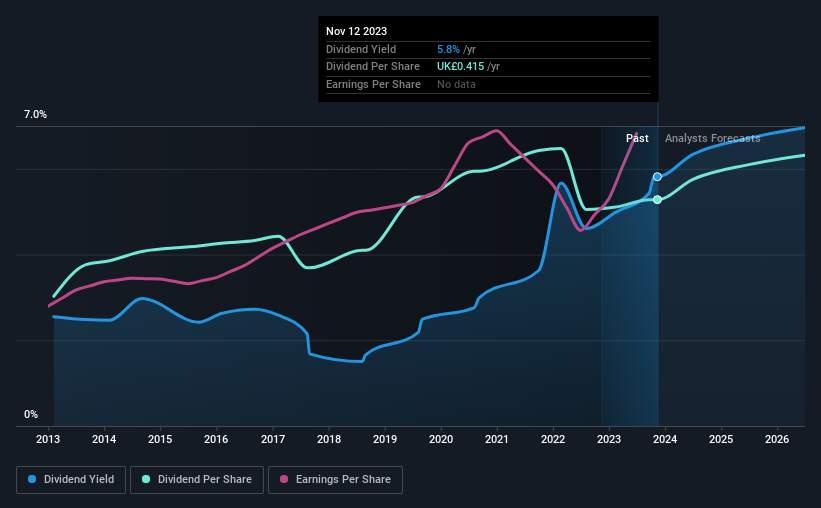Just Three Days Till Hargreaves Lansdown plc (LON:HL.) Will Be Trading Ex-Dividend
Hargreaves Lansdown plc (LON:HL.) is about to trade ex-dividend in the next three days. The ex-dividend date is usually set to be one business day before the record date which is the cut-off date on which you must be present on the company's books as a shareholder in order to receive the dividend. The ex-dividend date is an important date to be aware of as any purchase of the stock made on or after this date might mean a late settlement that doesn't show on the record date. Accordingly, Hargreaves Lansdown investors that purchase the stock on or after the 16th of November will not receive the dividend, which will be paid on the 15th of December.
The company's next dividend payment will be UK£0.29 per share, and in the last 12 months, the company paid a total of UK£0.41 per share. Based on the last year's worth of payments, Hargreaves Lansdown has a trailing yield of 5.8% on the current stock price of £7.134. Dividends are an important source of income to many shareholders, but the health of the business is crucial to maintaining those dividends. So we need to check whether the dividend payments are covered, and if earnings are growing.
View our latest analysis for Hargreaves Lansdown
If a company pays out more in dividends than it earned, then the dividend might become unsustainable - hardly an ideal situation. Hargreaves Lansdown is paying out an acceptable 61% of its profit, a common payout level among most companies.
Generally speaking, the lower a company's payout ratios, the more resilient its dividend usually is.
Click here to see the company's payout ratio, plus analyst estimates of its future dividends.
Have Earnings And Dividends Been Growing?
Businesses with strong growth prospects usually make the best dividend payers, because it's easier to grow dividends when earnings per share are improving. If business enters a downturn and the dividend is cut, the company could see its value fall precipitously. This is why it's a relief to see Hargreaves Lansdown earnings per share are up 6.5% per annum over the last five years.
The main way most investors will assess a company's dividend prospects is by checking the historical rate of dividend growth. Hargreaves Lansdown has delivered 5.7% dividend growth per year on average over the past 10 years. It's encouraging to see the company lifting dividends while earnings are growing, suggesting at least some corporate interest in rewarding shareholders.
Final Takeaway
Has Hargreaves Lansdown got what it takes to maintain its dividend payments? Hargreaves Lansdown has been generating some growth in earnings per share while paying out more than half of its earnings to shareholders in the form of dividends. We think there are likely better opportunities out there.
With that being said, if dividends aren't your biggest concern with Hargreaves Lansdown, you should know about the other risks facing this business. We've identified 3 warning signs with Hargreaves Lansdown (at least 2 which are significant), and understanding these should be part of your investment process.
If you're in the market for strong dividend payers, we recommend checking our selection of top dividend stocks.
Have feedback on this article? Concerned about the content? Get in touch with us directly. Alternatively, email editorial-team (at) simplywallst.com.
This article by Simply Wall St is general in nature. We provide commentary based on historical data and analyst forecasts only using an unbiased methodology and our articles are not intended to be financial advice. It does not constitute a recommendation to buy or sell any stock, and does not take account of your objectives, or your financial situation. We aim to bring you long-term focused analysis driven by fundamental data. Note that our analysis may not factor in the latest price-sensitive company announcements or qualitative material. Simply Wall St has no position in any stocks mentioned.

